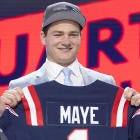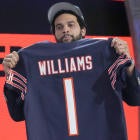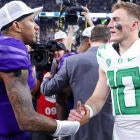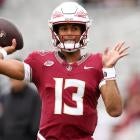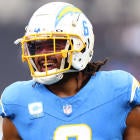They are the Bungles no more.
Hard as it is to believe, the Cincinnati Bengals actually look like they know what they're doing when it comes to the NFL Draft. They aced last weekend's exam and, I know, it happens. But this is the third straight year that it happened to the Bengals, and that's not luck. It's a trend, and I never thought I'd say this, but I'll try nevertheless.
Give it up for Mike Brown.
The Bengals' owner is pulling moves that make his team almost as much a threat to Baltimore and Pittsburgh off the field as they are on it. Once upon a time, the Bengals could be counted on for draft-day reaches and additions of ... how shall we put this? ... players with considerable baggage. But that seemed to change with the 2011 draft, when Brown found his franchise quarterback (Andy Dalton) and franchise receiver (A.J. Green) in the first two rounds.
| More on 2013 NFL Draft |
| Analysis |
 |
| Related content |
That was the year that ESPN's Rick Reilly lampooned Brown, calling him one of pro sports' "horrible bosses" and blamed him for running quarterback Carson Palmer out of Ohio. But what Reilly didn't say was that Brown wouldn't budge on the guy until someone made him an offer that he couldn't refuse, which Oakland eventually did.
The Raiders sent Cincinnati first- and second-round draft picks for a quarterback who vowed never to play again for the Bengals and, I don't know, but that sounds like smart business to me.
Then the Raiders last month turned around and sent Palmer to Arizona for a seventh-round pick. Let's see ... the Bengals gain first- and second-round draft picks for Palmer, while Oakland picks up a seventh. Hmm, where I come from, that makes Brown look like ... yep, a genius.
Of course, he has never been described that way, and he never will. But somebody should give the guy credit for getting smarter as he gets older.
Once upon a time, you could count on Cincinnati to overdraft based on need -- taking guys like Jerome Simpson in the second round and Andre Caldwell in the third of the same draft because the Bengals needed receivers. It was also an organization that didn't seem to give a rip about character, with Terrell Owens and Chad Johnson on the field at the same time.
But that was before 2011, the year the circus left town. In Cincinnati's last two drafts, the Bengals found Dalton, Green, guard Kevin Zeitler, promising cornerback Dre Kirkpatrick, guard Clint Boling and wide receivers Mohamed Sanu and Marvin Jones. Now they've added guys like tight end Tyler Eifert, running back Giovanni Bernard, defensive end Margus Hunt, safety Shawn Williams and linebacker Sean Porter and, suddenly, the Cincinnati Bengals look like a club with a plan.
"What's different," said one coach who played the Bengals last season, "is they're no longer reaching because of need. You could count on them to do that in the past. But now, when somebody good comes along, they don't let him get by them."
Eifert is a case in point. He was one of the top playmakers on everyone's board, and I can't imagine the Bengals were different. But he didn't fill a need. LSU's Eric Reid did, and it was no secret the Bengals would take him if he fell to them.
Only he didn't. San Francisco swung a deal with Dallas to jump in front of the Bengals and take Reid.
That left Brown with a dilemma. With defensive tackle Sharrif Floyd and cornerbacks Desmond Trufant and Xavier Rhodes still on the board, there was the temptation to swing in another direction when it was Cincinnati's turn at the 21st pick. Brown could lean there or try to solve a problem that plagued the Bengals in last year's playoffs and find a reliable ... and dangerous ... intermediate receiving threat.
He chose Eifert, and good for him.
The Bengals were never the same after losing Sanu late last season, but the addition of Eifert makes sure that won't happen again. It gives Dalton another weapon over the middle to overcome Houston -- the opponent that bounced Cincinnati from the last two playoffs.
But the Bengals also needed help with a running game that really hasn't been all that good for years, so Brown found Bernard -- a perfect complement to BenJarvus Green-Ellis -- with their second pick. Then Brown made defensive coordinator Mike Zimmer happy with the choice of Hunt, a guy whom some had ticketed for the bottom of the first round. And, just like that, the Bengals are locked and loaded for another playoff run.
I wonder what has changed in Cincinnati or with Mike Brown, and people who should know tell me nothing. He still runs the draft, listens to coaches and scouts and makes all the important decisions.
So maybe it says something about the value of stability, with coach Marvin Lewis in place since 2003. Or maybe it says something about the influence of an improved scouting department and the impact that it has on Brown and the coaching staff.
All I know is Mike Brown and the Cincinnati Bengals just got things right. Again.












